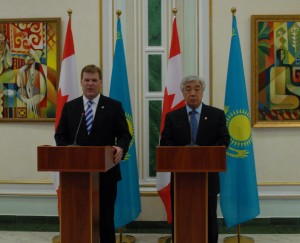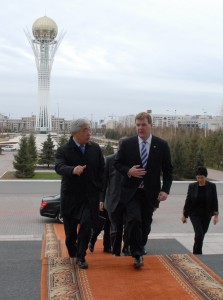 ASTANA, Nov. 13 – Kazakhstan and Canada signed a nuclear energy cooperation agreement during the first-ever visit of a Canadian Minister of Foreign Affairs to Kazakhstan. The agreement sets the stage for the expansion of the two countries’ already dynamic joint work. Canada and Kazakhstan are leading players in global nuclear energy.
ASTANA, Nov. 13 – Kazakhstan and Canada signed a nuclear energy cooperation agreement during the first-ever visit of a Canadian Minister of Foreign Affairs to Kazakhstan. The agreement sets the stage for the expansion of the two countries’ already dynamic joint work. Canada and Kazakhstan are leading players in global nuclear energy.
Canadian Minister of Foreign Affairs John Baird signed the agreement on Nov. 13 in Astana with Deputy Prime Minister and Minister of Industry and New Technologies Asset Issekeshev.
Prior to the visit, Canada’s Department of Foreign Affairs, Trade and Development said the agreement would provide “international treaty-level assurances that nuclear material, equipment and technology originating in Canada or Kazakhstan and transferred to the other will be used only for civilian and peaceful applications.”
“This deal will signal our commitment to the peaceful use of nuclear energy,” Baird said before his visit. “This agreement will also mean jobs and prosperity for Canada, which remains our top priority as a government, as well as for Kazakhstan. This agreement will permit nuclear trade between our countries by ensuring that any nuclear material, equipment or technology transferred between Canada and Kazakhstan will be used for peaceful purposes.”
Kazakhstan’s national atomic company Kazatomprom and Canada’s Cameco Corporation are the two companies cooperating most actively in the nuclear energy area. Last August, Kazakhstan’s ambassador to Canada, Konstantin Zhigalov, explained the reasoning behind the new bilateral agreement.
“The agreement will promote a new level of cooperation in the uranium industry, in which Kazakhstan is at the global forefront. In particular, it provides the opportunity to fully implement an agreement signed last year between Kazatomprom and Cameco Corporation, according to which the Canadian company is serious about expanding uranium mining in Kazakhstan and will build a production facility for processed uranium products in East Kazakhstan,” Zhigalov said.
In April 2013, Cameco Corporation’s Senior Vice President Bob Stine confirmed that agreement and said construction of the facility would begin in 2018, with production expected to begin in 2020.
On a visit to Astana on Nov. 13, Baird also met other government officials to promote bilateral commercial relations and to discuss regional and international security concerns. In Astana, he was received by President Nursultan Nazarbayev and Speaker of the Mazhilis of the Parliament Nurlan Nigmatulin.
Following a meeting with his counterpart, Kazakhstan’s Minister of Foreign Affairs Erlan Idrissov, the two ministers spoke to the media, with Baird praising the new nuclear cooperation deal as an indicator of expanding ties between the two countries in economic and commercial spheres.
“More than that, though, it is an expression of trust and confidence that our two governments have in our two countries,” Baird said, adding that he was excited to be in a “remarkable place.”
“We greatly appreciate the president of Kazakhstan’s leadership on nuclear nonproliferation. That is something that is well known around the world, and that type of leadership is very welcome in Canada,” Baird said.
He listed energy, mining, manufacturing, high-technology and agriculture as the most promising areas for cooperation, adding that Canada views Kazakhstan as a “platform for investment in Central Asia.”
Baird also congratulated Kazakhstan on the 20th anniversary of the tenge as its national currency, saying the changes in Kazakhstan’s economy and society since it was introduced in 1993 amounted to “extraordinary progress in a short period.”
Idrissov also noted the importance of the nuclear cooperation deal in opening new prospects for high-tech cooperation between the two countries and commented on Canada and Kazakhstan’s generally close political and economic ties.
“Kazakhstan and Canada share positions on many international issues of a regional and global nature,” Idrissov noted. “Both countries firmly adhere to nuclear nonproliferation and work closely in this area. Canada is Kazakhstan’s largest trading partner in the Western Hemisphere and is a source of major investment. There are major projects in nuclear energy and promising ones in agriculture and transport infrastructure.”
 Last year, Kazakhstan’s trade volume with Canada reached US$3.3 billion, and in the first nine months of 2013 it reached nearly US$1.93 billion. Canadian companies have invested US$6 billion in Kazakhstan overall, with the majority of these investments going into the oil and gas sector and the uranium industry.
Last year, Kazakhstan’s trade volume with Canada reached US$3.3 billion, and in the first nine months of 2013 it reached nearly US$1.93 billion. Canadian companies have invested US$6 billion in Kazakhstan overall, with the majority of these investments going into the oil and gas sector and the uranium industry.
Idrissov also added that President Nazarbayev met Canadian Prime Minister Stephen Harper at the G20 summit in St. Petersburg last September, reconfirming Kazakhstan’s desire to expand ties with Canada.
During the briefing, responding to a reporter’s question about cumbersome visa procedures for Kazakhstani citizens wishing to visit Canada, Baird said that he had heard a similar message about the need to improve the visa situation from both President Nazarbayev and Minister Idrissov and said he would take the issue back to his colleagues upon his return to Ottawa.
“We obviously want to do a much better job to facilitate travel, whether it’s for business, government-to-government relations [or] education,” Canada’s foreign minister said.
